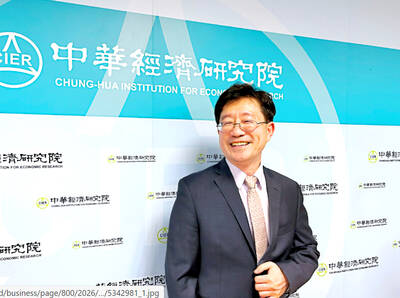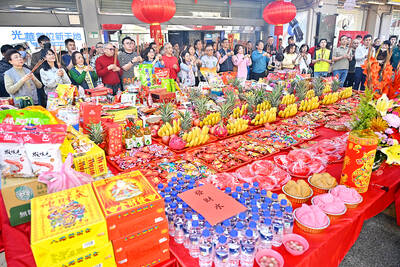The Democratic Progressive Party (DPP) yesterday criticized the cross-strait Economic Cooperation Framework Agreement (ECFA) “part fantasy,” saying it had failed to generate any substantial gains for Taiwan’s economy, while at a separate setting the Mainland Affairs Council (MAC) attributed the nation’s significant growth in exports of certain agricultural products to the trade pact.
At a press conference marking the first anniversary of the trade pact’s signing, Mainland Affairs Council Minister Lai Shin-yuan (賴幸媛) said exports of tea, orchids, grouper, milk fish and other agricultural products had increased 526 percent year-on-year to US$49.42 million during the January-to-May period after the ECFA took effect at the start of the year.
The figures show that critics of the trade deal are wrong and that the government has kept its promise to safeguard the interests of local farmers when it was negotiating the pact with China, Lai said.
Taiwan’s total exports to China rose 11.1 percent from the same period last year, but Taiwan was not overly dependent on China as its percentage of total exports had dropped from 43.3 percent last year to 40.7 percent this year, she added.
DPP spokesperson Chen Chi-mai (陳其邁), however, criticized government claims over the benefits of the ECFA at a press conference, saying that the pact had failed to spur domestic investment and instead accelerated capital outflows to China.
It has also failed to lift salaries, which have remained stagnant for the last decade, Chen said.
Chen said the DPP was of the opinion that the government’s rosy projections had fallen short and claims that the ECFA would create jobs and increase Taiwanese exports had failed to materialize.
“Instead, Taiwan’s income gap has grown to a historic high of 75 times [between the richest and poorest 5 percent], unemployment is still the highest among the Four Asian Tigers, and average salaries have fallen to levels seen 12 years ago,” he said.
Initial claims that the ECFA would spur the return of Taiwanese manufacturers have instead turned the other way around, Chen said, adding that the trade pact had increased the likelihood that companies would relocate to China to export back to Taiwan, taking advantage of lowered tariffs.
He said the administration of President Ma Ying-jeou (馬英九) needed to carefully review and “fix” the agreement.
DPP Chairperson and presidential candidate Tsai Ing-wen (蔡英文) has vowed to reassess the trade pact if elected next year, but has stopped short of calling for its nullification. Her remarks have largely been toned down since last year, when she openly called for a referendum on the ECFA.
In related developments, Bill Cho (卓士昭), director-general of the Ministry of Economic Affairs’ Bureau of Foreign Trade, said Taiwan was exploring the feasibility of an economic cooperation agreement with India and the Philippines with a view to signing free-trade agreements (FTA) with the two trade partners.
Cho said Indonesia had also expressed interest in conducting a feasibility study for a trade deal with Taiwan, while the Taiwanese government was actively seeking to make it into the list of Asian countries that are negotiating FTAs with the EU.
In the lead-up to signing the ECFA, the government claimed that the trade pact would pave the way for Taiwan to enter bilateral FTAs with other countries. Singapore was the first country to hold talks with Taiwan on signing a trade deal, doing so in August last year.
After the feasibility study with Singapore, which concluded that an economic cooperation agreement would benefit both countries, Taiwan and Singapore have launched formal talks focusing on tariffs, the opening of the service sector and economic partnerships.

The Grand Hotel Taipei on Saturday confirmed that its information system had been illegally accessed and expressed its deepest apologies for the concern it has caused its customers, adding that the issue is being investigated by the Ministry of Justice Investigation Bureau. The hotel said that on Tuesday last week, it had discovered an external illegal intrusion into its information system. An initial digital forensic investigation confirmed that parts of the system had been accessed, it said, adding that the possibility that some customer data were stolen and leaked could not be ruled out. The actual scope and content of the affected data

DO THEY BITE IT? Cats have better memories than people might think, but their motivation is based entirely around the chance of getting fed Cats can remember the identity of the people who fed them the day before, Taipei-based veterinarians said on Friday, debunking a popular myth that cats have a short memory. If a stray does not recognize the person who fed them the previous day, it is likely because they are not carrying food and the cat has no reason to recognize them, said Wu Chou Animal Hospital head Chen Chen-huan (陳震寰). “When cats come to a human bearing food, it is coming for the food, not the person,” he said. “The food is the key.” Since the cat’s attention is on the food, it

Taiwan must act to preempt potential Section 301 investigations as US President Donald Trump moves to a new tariff strategy, following a US Supreme Court ruling that voided tariff measures, an academic said yesterday. Countries running the largest trade surpluses with the US face a growing likelihood of Section 301 investigations, Chung-Hua Institution for Economic Research president Lien Hsien-ming (連賢明) said. Section 301 refers to a provision of the Trade Act of 1974 that allows Washington to impose retaliatory tariffs over perceived unfair trade practices, including the running of large trade surpluses. Because Taiwan has become the fourth-largest source of the US’ trade

People hold incense and pray with offerings in front of Taipei’s Kuanghwa Market yesterday. The fifth day of the Lunar New Year is traditionally about welcoming the God of Wealth, during which companies and shops set off firecrackers to celebrate their reopening and pray for good business in the new year.